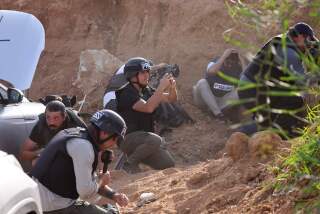Military injustice
- Share via
ARMY 1ST LT. EHREN WATADA may or may not have a good claim for conscientious objector status. It makes sense for the Army to prosecute him for refusing orders to deploy to Iraq last June, and Watada has at best an uphill battle in defending his actions, given that he joined the military of his own free will. But Army lawyers are overreaching when they try to prosecute their case by drafting reporters.
Watada faces a court-martial next month for missing his troop movement and for his published explanations of his refusal to go. The Army has his statements, but it subpoenaed reporters to authenticate that he, in fact, said what is in print and on tape.
Portions of independent journalist Sarah Olson’s interviews with Watada appeared on the website Truthout.org and were broadcast on radio stations in New York and the Bay Area. Freelance journalist Dahr Jamail had simply videotaped Watada’s speech at a Veterans for Peace convention. Honolulu Star-Bulletin reporter Gregg K. Kakesako also reported Watada’s story.
A military judge ruled that Olson and Jamail did not have to appear at Thursday’s pretrial hearing. But the Army is pressing forward with its demand that the two reporters testify at the trial.
No prosecutor should be able to conscript any reporter into being a deputy by compelling testimony about a statement made by a source -- or go fishing for information beyond what a reporter presents in a story -- unless it’s absolutely vital to protect U.S. citizens from crime or attack. This principle should apply whether or not the source was speaking in confidence, or whether or not the reporter works for a media organization.
It’s egregious enough when U.S. attorneys subpoena journalists, which is happening at an alarmingly increasing rate (illustrating the need for a national shield law). But there is something especially chilling about the U.S. military reaching beyond its traditional authority to compel a non-military U.S. citizen engaged in news-gathering to testify in a military court, simply to bolster a court-martial case. There is no security interest at stake, and no matter of national urgency.
The Army can make its case against Watada without pestering civilian journalists. Sustaining the military subpoena would set a troubling precedent. It’s time for the Army to back off.
More to Read
Sign up for Essential California
The most important California stories and recommendations in your inbox every morning.
You may occasionally receive promotional content from the Los Angeles Times.













